Social media advertising and the power of celebs
9 min read

Has the rise of social media changed advertisements forever as an increasing number of small businesses start turning to celebrities to promote their products?
Paying celebrities to endorse products isn’t a new concept. It’s been going on since the early 1940s when countless famous Hollywood box office stars would endorse cigarettes on posters. Throughout the years celebrity endorsement deals have not only changed radically but pushed the boundaries of what is seen as socially acceptable or within current advertising standards.
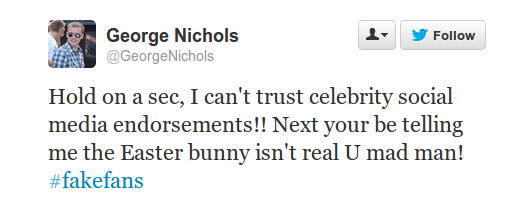
In 1985 Michael Jordan received a $5000 fine every time he stepped onto the basketball court for wearing “Air Jordan 1’s”, a fine that Nike covered, and the trainers went on to be a cultural phenomenon. The surge in social media and particularly Twitter and Instagram, due to its popularity with celebrities, has created a whole new world of advertising opportunities previously unknown.
Since the emergence of advertising on social media, each platform has made it clear what it classes as an “advertisement”. All platforms offer a range of promotional tweets or posts, whose reach and impact can fluctuate depending on how much money is invested.
However, social media’s popularity and entrenched connection with celebrities means there are questions that need asking when they mention a product.
- Are celebrities mentioning these products for the sake of sponsorship, advertisement or purely for the love of a selected product?
These days, sponsored posts and videos are the preferred way to gain publicity. Some platforms, like Facebook, have managed to add features which make sponsored content easy to distinguish, however, for platforms like Twitter, it is not so easy as there is no option to identify an ad.
Increasing Regulation
More now than ever, the Advertising Standards Authority (UK) and Federal Trade Commission (USA) are trying to combat the way endorsed posts are perceived by enforcing #ad or #spon (or #sp for short) that are meant to be placed within posts highlighting when celebrities have been paid to promote products. It’s not only that, celebrities are known to get grief from their followers if they don’t clearly state when they are being paid to say certain things or promote products.
In the USA, investigations into celebrities not making it clear enough when their content is being sponsored has been carried out.
BBC News states the following:
- “Some disclosures which had been made were not clear enough. It said that “#sp,” (an abbreviation for sponsored), “Thanks [Brand],” or “#partner” in an Instagram post did not make it obvious to many people that a post was paid for.
- Instagram users on smartphones typically see just the first three lines of text on a post, unless they expand it. Therefore disclosures should be made high up in the post.
- When multiple tags, hashtags, or links are used, readers may just skip over them – meaning a disclosure may not be conspicuous.”
So, now how is this having an effect on the way celebrities and social media platforms are going about endorsed posts?
Instagram and Facebook Branded Content
Facebook has pushed guidelines around promotional posts announced March 2017: ” We’re rolling out updates to make branded content more widely available to more creators, improving the post tag to be clear, and updating the policy to give creators/publishers more flexibility for featuring business partners.” This branded content feature means that anyone doing any paid promotions can make it clear to their Facebook audience that they are being paid to do so. However, at the beginning of 2018, Facebook announced a further update to this branded content tool which made the rules of promotional posts on Facebook far more strict. Facebook owns Instagram so this feature has been incorporated. This shows that Facebook and Instagram are easy to understand when a post is sponsored or not.
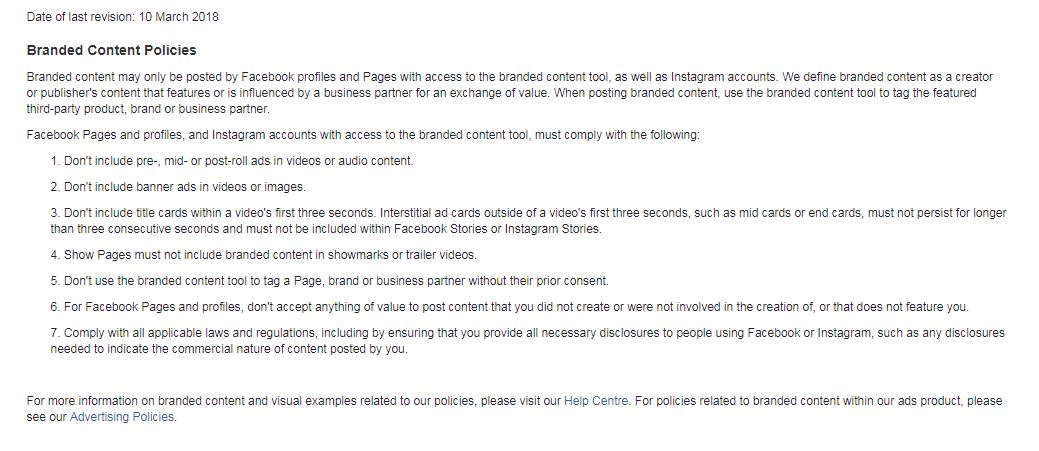
Here is an example of this branded content feature in use. Khloe Kardashian promoting Amazon on Instagram, it’s obvious she’s being paid due to the use of ‘#ad’ and ‘Paid partnership with amazon’ just below her username.
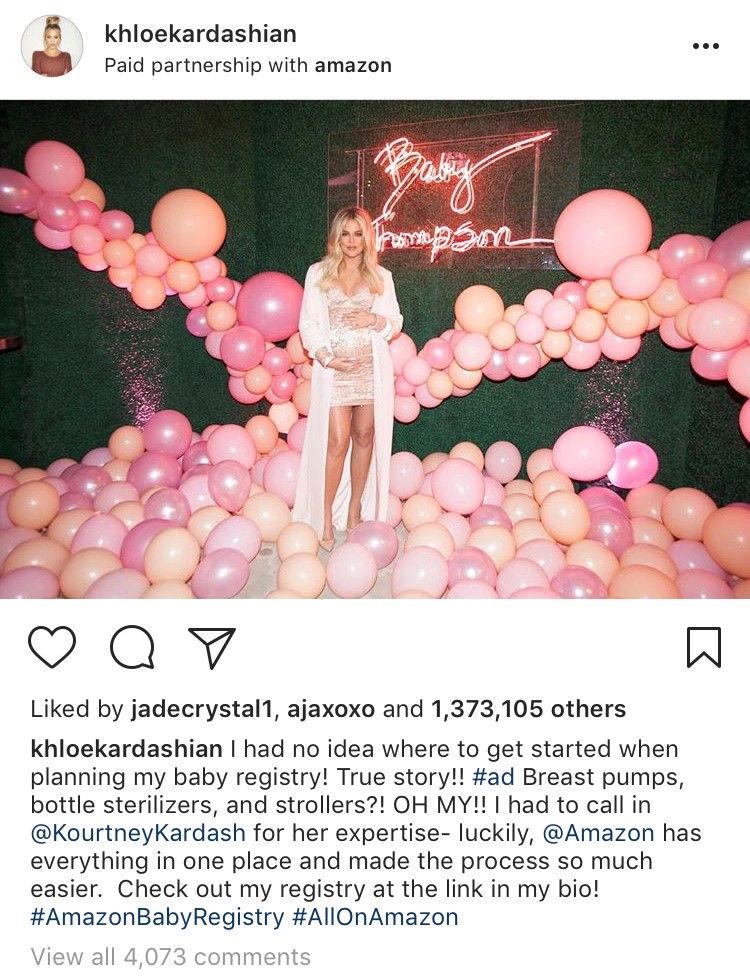
AdSense & Paid Ads on YouTube
Despite being around since 2005, YouTube has newly found fame in the past few years and is one of the top platforms for endorsed promotions. As it’s still fairly new to many people and it’s a completely different style to platforms like Twitter and Facebook, people are still getting to grips with it. It’s quite a controversial platform when it comes to sponsorship and endorsed content as it’s quite difficult to decipher what’s an ad and what’s not. As YouTubers commonly talk about and give reviews of many products in their videos, especially when their channel is about fashion and beauty, it can be difficult to tell whether opinions expressed are genuine or if they’re being paid. Therefore, YouTubers often choose to make disclaimers to avoid the backlash from their viewers assuming that they’re hiding the fact that they’re being paid as well as the code enforced by the ASA.
As advertisements are so common now, it’s a general assumption to believe that all opinions are being paid for, so many YouTubers even make a disclaimer just to say that they haven’t been endorsed in any way so people know that their opinion is genuine.
A prime example, with over 12 million subscribers, and one of the earliest YouTubers to have found fame, Zoella makes it clear to her viewers that she is being paid.
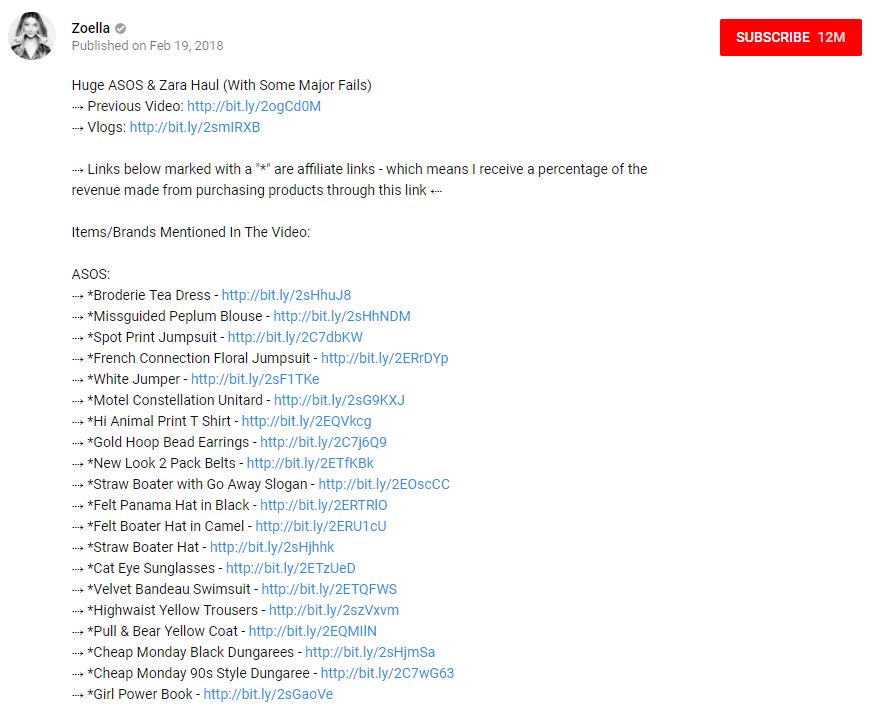
Google AdSense
AdSense is an advertising platform run by Google and as YouTube is owned by Google – it’s run on YouTube too. It allows creators to serve automatic text, image, video, or interactive media advertisements that are targeted to site content and audience. Once a YouTube channel reaches 4000 watch hours in the previous 12 months and 1000 subscribers, they may be offered to join YouTube’s partnership program, meaning YouTubers can choose to have ads before and during their videos. They can also choose the type of ads to be shown so they can relate more to their channel. They will then receive profit from these ads if they’re watched for longer than 30 seconds or if the ad is clicked on. This is an altogether different type of advertising that you wouldn’t find on any other social media platform yet it’s probably one of the best as it’s completely clear to the audience that it’s an advert.
Celebrity Social Blunders
This isn’t a new area to be explored. As early as January 2012 Snickers pushed the boundaries when paying a range of celebrities, including Katie Price and Rio Ferdinand, to promotionally tweet themselves enjoying this chocolate bar. Despite the tweets being clear advertisements, the tweets did not contain Twitter’s expected promotional banner. After investigation the tweets were deemed acceptable by the ASA because they were not breaking advertising code, as all tweets contained:
“You’re not you when you’re hungry @snickersUk #hungry #spon”.
In 2014, Gareth Bale did a series of tweets promoting the new Adidas football boot range without #ad or #spon in the tweet. This is something fellow footballer Wayne Rooney had been in trouble for in the past. Gareth has very clear links with the Adidas Company and the professionalism of the photograph means it should be labelled as a promoted tweet but it wasn’t – so how are the general public, including his young fan base, to know this?
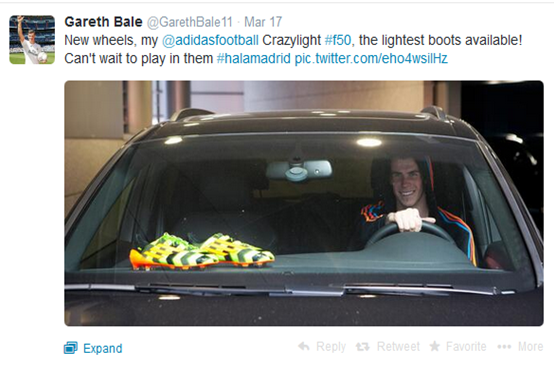
The Kardashian Clan
The Kardashian family are no strangers to being paid to post. Although not a Kardashian himself, Scott Disick plays a big part in the popular TV show ‘Keeping Up With The Kardashians’ due to his relationship with Kourtney Kardashian. He made this spectacular fail in May 2016, when uploading an Instagram post sponsored by Bootea. Instead of just inserting the caption they asked, he accidentally included the whole instructions and deleted it a short while after – but was it an accident? This post really got everyone talking. A comment on the Instagram from ‘jqtaub’ sarcastically says “..if Scott drinks it should we?” meaning people know that products are just being sponsored and celebrities are just making their living but does it still work? Would brands still be paying to do these if it didn’t? Due to the lack of #ad or anything suggesting that this was sponsored, maybe the fact that Disick included the instructions was his way of saying it was an ad?
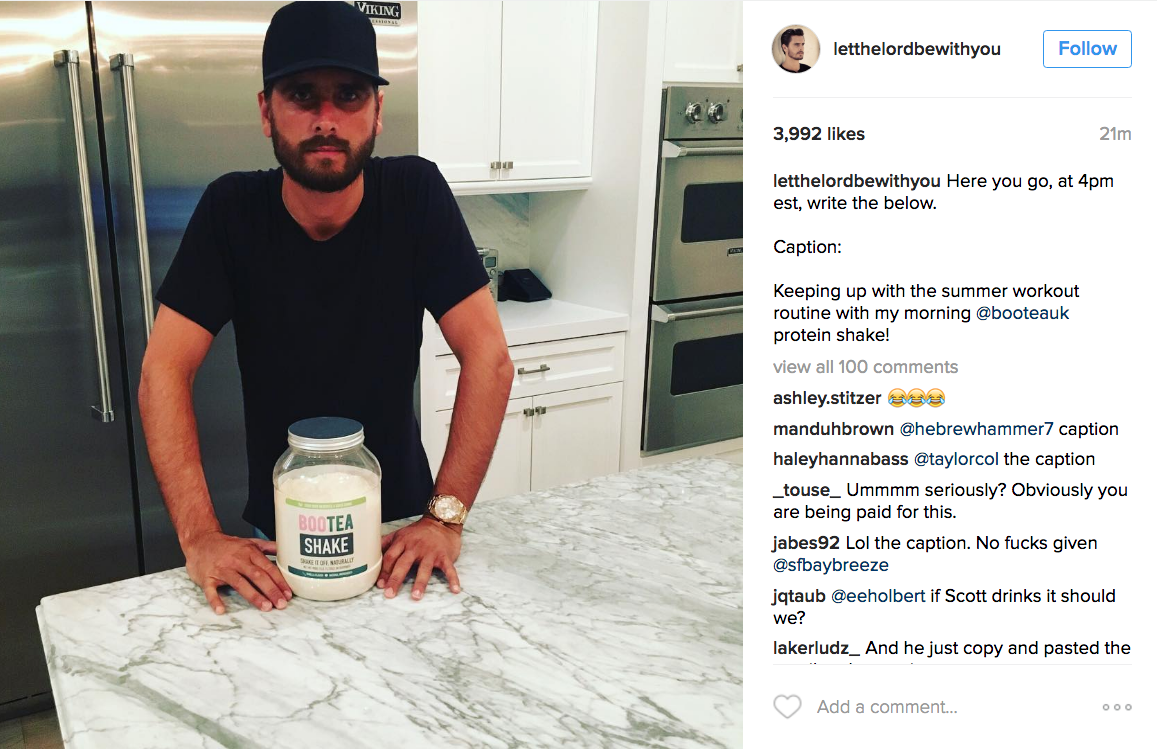
How Much Are Celebrities Being Paid For Advertisements?
Rumours have it that Scott Disick earns between $15,000-$20,000 per post and these are just figures from 2016, it’s probably grown a lot more over the past year or so due to his increasing popularity.
According to an article by Unilad (2017), “It’s reported that on average, one in 20 Instagram users now monetise their posts, and sponsored content has increased by more than a third on the social media platform since 2015. Instagram said they do not comment on third-party studies, so wouldn’t confirm whether the figures were accurate.” Unilad also provided a follow up on how much various celebrities earn per advertised post and the figures are astonishing – below is the 2017 Instagram Rich List.
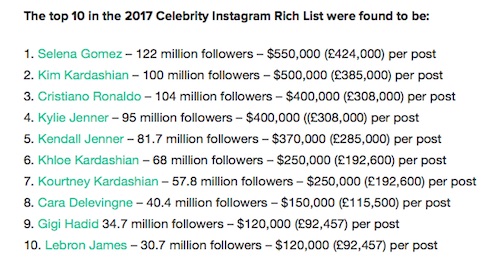
We originally wrote this blog in 2014, in which we stated “Kim Kardashian is reportedly earning over $8000 for some Tweets. However, how does the public know if a tweet is a promotion or a product that the celebrity has genuinely enjoyed? In May 2013 Kim Kardashian sent a potentially promotional tweet “Pregnancy lips…. @EOS to the rescue! LOL”. This tweet went on to gain massive coverage, not only on Twitter but also gaining numerous mentions in the press and magazines.” The amazing thing is that fast forward 3-4 years and she’s now reported to be earning $500,000 a post! This really shows how far social media and paid endorsements have come.
It’s clear that the influence that celebrities can have on their impressionable audience is really worth investing hundreds of thousands of pounds on, otherwise, why would it be so popular?
The beauty of social media is how it has broken down the barrier between consumer and business, however there are still some cases of blurred boundaries between what counts as advertisement and promotion for businesses. Many people will argue that these examples are fairly obviously promotional tweets, but that seems to be missing the point. Advertising regulation is clear in stating that for consumer protection “you can’t mislead or harass consumers with false or deceptive messages”.
Big corporate brands have always looked to push the boundaries when it comes to advertising but is this an area that smaller business can look to venture into?
Imitating the leaders
Where the big brands go smaller business tends to follow – for example, a tweet done by little-known footballer Dwight Gayle for Crystal Palace in 2014 when he tweeted “In need of any heating or plumbing services around Essex and Hertfordshire get on to @GREENPLUMBING_”.
This highlights the potential future for business promotion on Twitter. Due to Gayle not being an international superstar, he is more likely to have followers who support the club and live around the local area increasing the potential return on investment for the business for such a potentially promotional tweet. Although this tweet didn’t gain a positive reaction, the plumbing company named still got masses of exposure, something that might not have been achievable through standard sponsored tweets.
Dragons Den
However there are ways in which celebrities can endorse small businesses and products without disregarding advertising standards. One way can be seen through Theo Paphitis’ famous Small business Sunday (#SBS) which helps smaller businesses promote themselves on Twitter. In 2010 the former Dragons Den star started a competition where, between 5.00pm – 7.30pm, small businesses tweet using #SBS highlighting what was great about their business. Theo then retweets his 6 favourite ones to his 421K followers, which can virtually transform the small businesses overnight. Here he isn’t retweeting for financial benefit but more for the enjoyment of giving a helping hand to small businesses, of course, it does help enhance his personal brand.
The power of the celebrity promoted posts is clear; it can have a potential reach and coverage unattainable through standard sponsored posts. Despite a potentially negative response, we can only assume that these types of promotional tweets will become ever more common, but guidelines and laws remain unclear on who should be held accountable for these promotional posts.
Will non-media trained celebs and sports stars know what is acceptable without the #ad or #spon tag? Do social media guidelines need to be made clearer about what is or aren’t acceptable similarly to Facebook branded content? Do they need to spell out how they intend to enforce the law or will they start looking into solutions on how to get a share of the money? One thing is clear: as social media’s astronomical growth continues, its impact on marketing and advertising will become ever more profound.
Social Media Advertising For Smaller Businesses
The way that social media has massively grown and had an impact over the years, makes it an opportunity every business should grab – even if you’re just the local fruit and veg shop. Social media platforms aren’t just for the big brands who can pay the big bucks anymore, anyone can advertise anything for any price. The introduction of features like Facebook Pixel and Twitter’s conversion tracking mean anyone can attribute their leads back to social media. It’s understandable that it’s quite a big task for small businesses to get big celebrities on board to promote them, especially if they don’t have much budget, but you can advertise yourself for cheaper. For example, Facebook lets you advertise from as little as £4 a day and you can target specific and local audiences that would work for your business best.
Facebook has recently changed its algorithm so content from friends and family is prioritised over content from businesses so advertising is one of the only ways to get yourselves out there. Even just having a presence on social media can have a great impact on your business meaning you can get more publicity, leads and much more for free. It’s really no wonder why it has become so popular.
